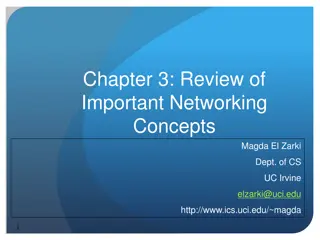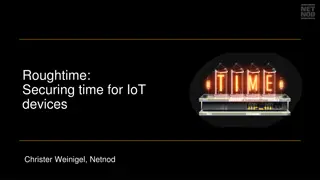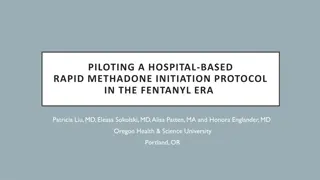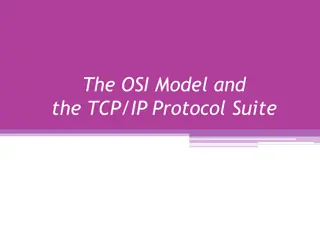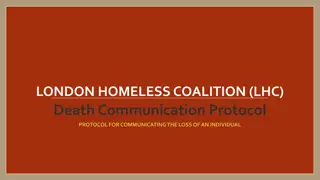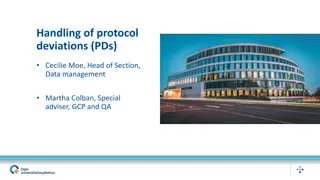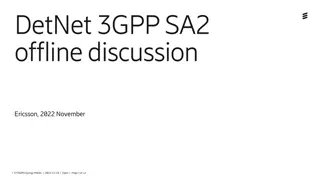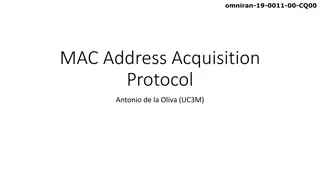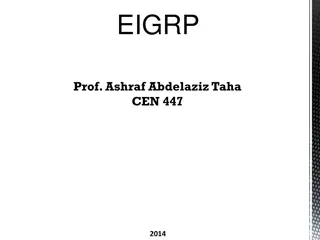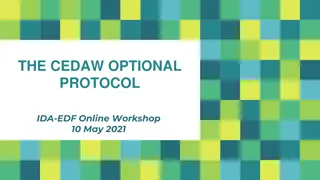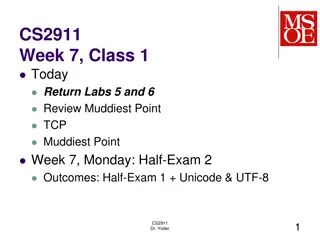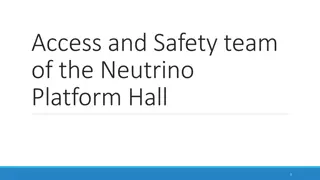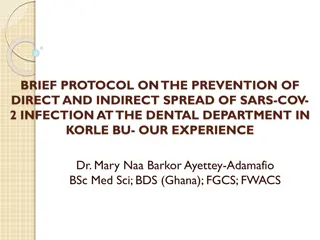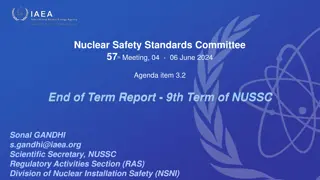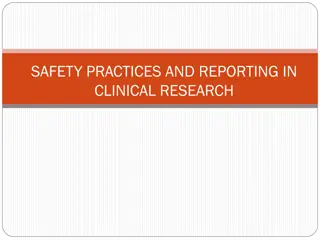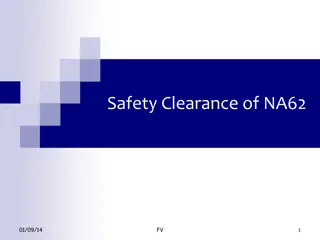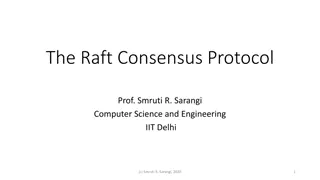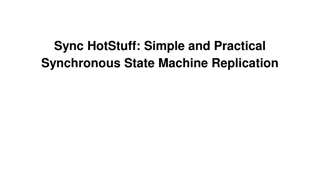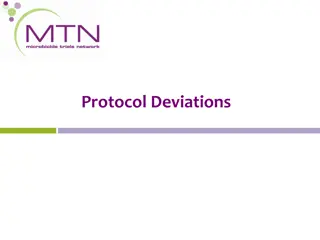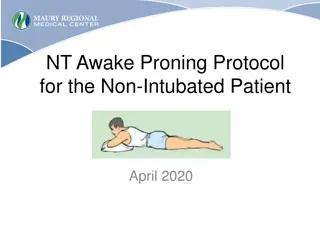Adaptive Tree-based Convergecast Protocol
Adaptive tree-based protocol for managing overlay networks in heterogeneous networks. It proposes improvements to the existing Tree-Based Convergecast Routing (TBCR) protocol by considering additional parameters such as RTT, power consumption, link stability, and link mobility to optimize routing de
32 views • 12 slides
Addressing 5G Signaling Protocol Vulnerabilities
The 8th meeting of the Communications Security, Reliability, and Interoperability Council to discuss and address security vulnerabilities in the newly adopted 5G signaling protocol, HTTP/2. Learn about potential risks, recommended safeguards, and the prevention of these vulnerabilities in the upcomi
3 views • 85 slides
Suicide Prevention & Postvention Protocol
This protocol provides practical advice and support for schools and colleges in Hampshire to navigate the aftermath of a suspected suicide among students or staff members. It includes guidance on interventions, critical incident response, and resources to support the bereaved. Key stages of the post
0 views • 37 slides
Comprehensive ICU Protocol for Sedation, Analgesia, and Delirium Control by Dr. Vinod Srivastava
This comprehensive ICU protocol by Dr. Vinod Srivastava, an Associate Professor in Anaesthesiology & Critical Care at KGMU, covers key aspects such as sedation, analgesia, delirium assessment and control, stress ulcer and deep vein thrombosis prophylaxis, and glycaemic control in the ICU setting. Th
1 views • 50 slides
Important Networking Concepts Overview
Review essential networking concepts including protocol architecture, protocol layers, encapsulation, network abstractions, communication architecture, and TCP/IP protocol suite. Understand the functions of different layers in networking for reliable data transfer and communication efficiency.
3 views • 43 slides
Roughtime: Securing time for IoT devices
Accurate time is crucial for security protocols like DNSSEC and TLS in IoT devices. Roughtime protocol, with improved accuracy and security features, provides a solution for securing time in resource-constrained environments. The protocol addresses the bootstrapping problem and allows for microsecon
1 views • 8 slides
Hospital-Based Rapid Methadone Initiation Protocol in Fentanyl Era
The study explores the implementation of a rapid methadone initiation protocol in a hospital setting to address the challenges posed by fentanyl in opioid use disorder treatment. The team's experience over nine months following the protocol's introduction is detailed, highlighting the importance of
2 views • 22 slides
Enhancing Safety: People Power SafetySTEP Refresher Training
Explore the comprehensive SafetySTEP Refresher Training program aimed at achieving safety through employee participation, engagement, and proactive safety measures. This training emphasizes creating a culture where safety is a core value, utilizing leading indicators to measure safety successes, and
0 views • 65 slides
Understanding OSI Model and TCP/IP Protocol Suite
Explore the concept of layering in data communication, comparing the OSI model and TCP/IP protocol suite. Learn about protocol layers, protocol hierarchies, and the functionality of each layer in these models. Discover the interrelationships between layers and the evolution from OSI to TCP/IP.
5 views • 57 slides
National Mine Safety Week 2023 - Vehicle Safety Guidelines
Explore the comprehensive safety guidelines for vehicle operation during National Mine Safety Week 2023. Learn about maintaining safety equipment, cabin safety systems, visibility safety systems, operational safety systems, emergency safety systems, other safety systems, training responsibilities, a
1 views • 10 slides
London Homeless Coalition (LHC) Death Communication Protocol
In 2014, the Memorial Committee of the London Homeless Coalition (LHC) established the Death Communication Protocol to acknowledge, share, and address the loss of individuals experiencing homelessness. The protocol aims to inform partnering organizations of confirmed or unconfirmed deaths, support g
0 views • 12 slides
Understanding Mobile Computing and TCP/IP Protocol Suite
Mobile computing is crucial for continuous internet connectivity regardless of physical location. The TCP/IP protocol suite, consisting of Transmission Control Protocol (TCP) and Internet Protocol (IP), forms the backbone of internet infrastructure. IP addressing and mobility challenges are addresse
1 views • 51 slides
Effective Protocol Deviation Management in Clinical Research
Understand the importance of handling protocol deviations in clinical trials to ensure patient safety, data integrity, and compliance with regulatory requirements. Explore SOPs, electronic systems, and best practices for managing deviations effectively. Learn about GCP requirements, DMC usefulness,
0 views • 22 slides
DetNet 3GPP SA2 Offline Discussion Summary
The DetNet 3GPP SA2 offline discussion held by Ericsson in November 2022 covers several outstanding issues related to DetNet architecture, including support for an optional NEF, uplink routing information reporting, and the role of NEF in protocol conversion. Three alternative approaches for NEF imp
0 views • 12 slides
Understanding OSI Model and TCP/IP Protocol Suite in Computer Networking
This chapter explores the OSI model and TCP/IP protocol suite, delving into protocol layers, addressing mechanisms, and network components. It highlights the interface between layers, functions of each layer in the OSI model, and compares TCP/IP protocol suite layers with OSI model layers. The discu
0 views • 30 slides
International Relations and Protocol Division Presentation to Presiding Officers on Operations
The International Relations and Protocol Division (IRPD) was established in 2010 to enhance Parliament's international relations capacity and strategic objectives. The division focuses on improving parliamentary international engagement, providing advisory services, managing logistical operations, c
0 views • 22 slides
Understanding the Nagoya Protocol on Access and Benefit Sharing
The Nagoya Protocol, a supplementary agreement to the Convention on Biological Diversity, aims to ensure fair and equitable sharing of benefits from genetic resources. It provides a legal framework for accessing and utilizing biological resources, emphasizing transparency and sustainability. The Pro
0 views • 11 slides
MAAP Protocol Overview in IEEE 1722: Address Acquisition and Message Format
The MAAP (Multicast Address Acquisition Protocol) is defined in IEEE 1722 for time-sensitive applications in bridged local area networks. It involves acquiring multicast addresses through claiming, probing, and defending messages. MAAP enables dynamic allocation of addresses and defending against co
1 views • 8 slides
Comparative Analysis of Aviation Safety Management Systems: MSG-3 vs. SMS
The aviation industry continuously strives to enhance safety, leading to the development of Safety Management Systems (SMS) by ICAO and the longstanding Maintenance Steering Group (MSG-3) program. These systems focus on improving safety through different approaches, with MSG-3 emphasizing engineerin
1 views • 25 slides
IEEE 802.11-20/1761r1 Ranging Protocol for 11bd
This document outlines the ranging protocol proposed for IEEE 802.11-20/1761r1, focusing on RTT-based ranging leveraging multi-channel operation. By integrating the 11az ranging protocol, it enables flexible and low-overhead application in 11bd for improved accuracy in ITS bands. The protocol includ
1 views • 13 slides
Understanding EIGRP: A Comprehensive Overview
Enhanced Interior Gateway Routing Protocol (EIGRP) is a dynamic routing protocol providing various advantages to network administrators. It is a classless routing protocol supporting VLSM and is considered an Interior Gateway Protocol (IGP). EIGRP uses advanced distance vector routing and is known f
1 views • 5 slides
Understanding the CEDAW Optional Protocol
The CEDAW Optional Protocol is a separate treaty from the UN Convention on the Elimination of Discrimination Against Women (CEDAW). It enhances CEDAW by allowing individuals to bring complaints to the Committee for violations when national remedies fail. The Protocol establishes procedures for commu
5 views • 12 slides
Understanding TCP Protocol and Reliability in Networking
This content covers key concepts related to the TCP protocol in networking, including TCP header fields, sequence and acknowledgement numbers, the 3-way handshake, and reliability mechanisms such as error detection, feedback, and retransmission. It also discusses potential issues in TCP communicatio
8 views • 41 slides
Proactive Safety Measures: PDO Safety Stand Down April 2024
A Safety Stand Down is a crucial activity to proactively discuss safety with employees, emphasizing risk awareness and injury prevention. The incident involving a fatal injury during Rig Move activities serves as a catalyst for reflection and improvement regarding safety procedures. This guide provi
1 views • 4 slides
Tamper-Evident Pairing (TEP) Protocol for Secure Wireless Pairing Without Passwords
This article discusses the challenges of traditional secure wireless pairing methods that rely on password validation and proposes the Tamper-Evident Pairing (TEP) protocol as a secure in-band solution to protect against Man-in-the-Middle (MITM) attacks. TEP eliminates the need for out-of-band chann
1 views • 40 slides
Understanding SFTP Server Functionality with ACS 5.x by Mohammad Azharuddin AAA Team
SFTP (SSH File Transfer Protocol) is a secure network protocol for file access, transfer, and management over reliable data streams. It enhances security by extending the SSH protocol and can be implemented using a reliable 8-bit byte stream protocol. SFTP commands are sent as 4 ASCII letters follow
4 views • 23 slides
Enhanced Family Court Police Disclosure Protocol for 2024
The 2024 Family Court Police Disclosure Protocol addresses key issues identified in the 2013 protocol, emphasizing timely and proportionate requests for material. Changes include a new checklist for the judiciary, guidance notes, and revised processes for litigants in person. The protocol provides c
1 views • 19 slides
Neutrino Platform Hall Access and Safety Guidelines
Guidelines for accessing and ensuring safety within the Neutrino Platform Hall at CERN, including registration, permissions, safety trainings, required equipment, online trainings, access points, and safety team responsibilities. Access is granted through registration at CERN, completion of safety t
1 views • 7 slides
Importance of Safety Education for Graduate and Undergraduate Students
Graduate and undergraduate students often lack safety knowledge and ethics, emphasizing the need for safety education over mere training. Safety education builds critical thinking, promotes safety ethics, and prepares individuals to handle future safety issues. Incorporating safety teachings through
3 views • 11 slides
Essential Elements of Clinical Trial Protocols
Understanding the key components of a clinical trial research protocol is essential for conducting successful studies. This includes identifying session objectives, discussing trial protocol contents, exploring observational study elements, and learning about reporting guidelines. Study objectives f
1 views • 25 slides
Protocol for Preventing SARS-CoV-2 Spread at Dental Department in Korle Bu
This protocol outlines measures to prevent direct and indirect spread of SARS-CoV-2 at a dental department in Korle Bu, Ghana. It includes initial preventive measures like vitamin C distribution, enforcement of routine protocols such as pre-screening, mask-wearing, and disinfection, and the use of p
0 views • 21 slides
NUSSC 57th Meeting - End of Term Report & Safety Standards Update
The 57th Meeting of the Nuclear Safety Standards Committee (NUSSC) concluded its 9th term with significant achievements including the approval and publication of multiple safety standards. Key highlights include the development of new standards such as SSG-3, SSG-88, SSG-89, and SSG-90 focusing on v
0 views • 8 slides
Safety Practices and Reporting in Clinical Research
Safety practices and reporting in clinical research are crucial for ensuring the rights, safety, and well-being of trial subjects. This includes monitoring safety, reporting adverse events promptly, and following regulatory requirements. Investigators play a vital role in assuring subject safety and
0 views • 33 slides
Safety Clearance Procedure for NA62: Overview and Recommendations
The conventional safety clearance procedure for NA62 involves checks by DGS-SEE (HSE) and obtaining radiological safety clearance from the DGS/RP group. Various safety checks are outlined in memorandums by Mark Hatch and Jonathan Gulley. Safety files for NA62 are noted to be in poor states, lacking
0 views • 8 slides
Understanding the Raft Consensus Protocol
The Raft Consensus Protocol, introduced by Prof. Smruti R. Sarangi, offers a more understandable and easier-to-implement alternative to Paxos for reaching agreement in distributed systems. Key concepts include replicated state machine model, leader election, and safety properties ensuring data consi
0 views • 27 slides
Sync HotStuff: Practical Synchronous State Machine Replication
Sync HotStuff is a practical synchronous protocol that tolerates Byzantine replicas and handles weaker synchrony models. It overcomes issues of requiring a large number of rounds and lock-step execution. The protocol ensures safety by committing blocks and guarantees liveness by continuing to commit
0 views • 15 slides
Understanding Protocol Deviations in Clinical Trials
Protocol deviations are expected occurrences in clinical trials that may arise from site or participant actions. It is crucial for research teams to identify, report, and learn from these deviations to ensure the integrity and safety of the study. Mechanisms for identifying and reporting deviations,
0 views • 16 slides
Understanding OSI Model and TCP/IP Protocol Suite in Computer Networking
This content delves into the OSI model and TCP/IP protocol suite, highlighting the protocol layers, addressing mechanisms, and communication scenarios. It explores the functions of each layer, the interface between layers, and compares the TCP/IP layers with the OSI model. Through examples and illus
0 views • 46 slides
Seeking a General-Purpose CCSDS Link Layer Protocol: Next-Generation Data Link Protocol (NGDLP)
This document discusses the proposed Universal Frame Format for a next-generation data link protocol, focusing on major questions about transfer frames, Protocol Link Transmission Unit (PLTU), and Universal Transfer Frame Structure. It explores topics such as frame formats, telemetry transfer frames
0 views • 24 slides
NT Awake Proning Protocol for Non-Intubated Patients
This protocol outlines the benefits and procedure for prone positioning in non-intubated patients experiencing mild to moderate hypoxemia. It highlights patient eligibility criteria, equipment required, and considerations for nursing care. The protocol emphasizes improving oxygenation by promoting a
0 views • 11 slides




